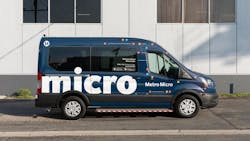L.A. Metro to implement Phase 2 of NextGen Bus Plan
The Los Angeles County Metropolitan Transportation Authority (L.A. Metro) will begin implementing the second phase of the NextGen Bus service changes on June 27, as part of the agency’s NextGen Bus Plan to improve bus frequencies and better serve riders.
The changes will be accompanied by the expansion of Metro Micro into two new service zones: Highland Park/Eagle Rock/Glendale and Altadena/Pasadena/Sierra Madre. Additionally, a portion of a dedicated bus only lane along Alvarado Street is also being implemented.
Bus trips are being added to many L.A. Metro bus lines to improve the frequency of service and to move toward restoring transit service levels to pre-pandemic levels by September. The most significant changes to the bus route structure will be seen in the San Fernando Valley and San Gabriel Valley.
“Metro’s bus network is the backbone of our transit system, and the NextGen Plan is our next step toward higher ridership, faster and more reliable service and lower emissions,” said Los Angeles Mayor and L.A. Metro Board Chair Eric Garcetti. “This next phase of Metro services sends a clear message to Angelenos: We hear your feedback and are working tirelessly to make our system work better for you.”
A full list of routes and stops impacted by the changes is available on L.A. Metro’s website.
L.A. Metro will also be improving weekday rail service frequencies during morning and afternoon peak times on the A Line (Blue), E Line (Expo), C Line (Green) and L Line (Gold).
Patrons can check for specific bus and rail changes with L.A. Metro’s online tool at metro.net/mybus. Brochures summarizing all service changes are also available on-board buses and trains. Those riders using the Transit app, Metro’s official smartphone app, can check schedule changes on June 27.
When the NextGen Bus Plan is fully implemented in December 2021, there will be more frequent all-day bus service on more routes, shorter wait times for buses and more reliable service — improvements already taking place during the ongoing pandemic. Metro Micro, in turn, will provide a new, convenient, on-demand alternative to driving alone with shared rides being offered in the two new service zones.
“The NextGen program is a major enhancement of Metro’s bus network that demonstrates the benefits of a holistic network-based approach that will benefit riders for decades to come,” said Metro CEO Stephanie Wiggins. “We are excited about the roll-out of Phase 2 and what it will do for our customers. Other transit agencies around the country have inquired how they can model our NextGen in their own systems.”
Metro Micro was first launched in December in partnership with RideCo, Inc. The service, which is operated by L.A. Metro employees within select service zones, has an introductory fare of $1 per ride (transfer not included) through the end of 2021. Rides must begin and end within each zone.
The Highland Park/Eagle Rock/Glendale service zone will bring a new, flexible option for riders wanting to connect to destinations such as Glendale Community College and Occidental College, hiking and outdoor activities and easy connections to Metrolink’s Glendale Station and Metro’s L Line (Gold). The Altadena/Pasadena/Sierra Madre service zone will provide easy access to key destinations such as the NASA Jet Propulsion Laboratory, Pasadena Community College, Caltech, downtown Pasadena and connections to Metro’s L Line (Gold).
The two new zones join five additional service zones that have launched since December: Watts/Willowbrook, LAX/Inglewood, Compton/Artesia, North Hollywood/Burbank and El Monte.
“The continued implementation of NextGen, expansion of MicroTransit, and installation of bus lanes is critical, especially as we enter the recovery phase of the pandemic,” shared Los Angeles County Board of Supervisors Chair and Metro Vice Chair, Hilda L. Solis. “These efforts will help provide more frequent and faster mobility options to our transit riders, predominantly serving communities of color. When we invest in public transit, we are making a commitment to supporting our communities.”
As part of NextGen and the agency’s Better Bus Initiative, L.A. Metro has been working with the Los Angeles Department of Transportation (LADOT) to implement a series of dedicated bus only lanes along heavily traveled corridors. By the end of June, phase one of the Alvarado Street dedicated bus only lanes will be implemented between 7th Street and the 101 Freeway.
The Alvarado Street Bus Priority Lane Project is an important step in building a safer and faster multi-modal transit network in Los Angeles. It will enhance mobility and safety for the thousands of people who ride transit to get to and from school, work, businesses and appointments along the corridor.
Once completed, this project would run along a 1.7-mile segment of Alvarado Street between 7th Street and Sunset Boulevard, adding a bus priority lane in the peak direction from Monday through Friday during the morning and evening peak rush hours.
Bus priority lanes improve bus speeds by as much as 15 percent, increasing service frequency and reliability along the corridor. They also improve mobility by moving more people without adding more infrastructure.
The state of California reopened earlier this month. To accommodate the increase in bus riders, L.A. Metro will resume front door boarding on June 27. All door boarding on buses will help move more people, more quickly.



